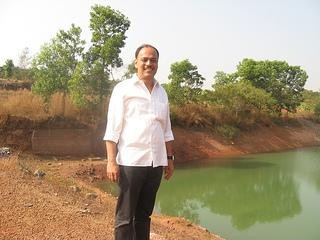Water Management
Awareness and brainstorming on urban wetlands of Maharashtra by TERI on the occasion of World Wetlands Day 2013
Posted on 10 Mar, 2013 11:29 PMHow do groundwater irrigation and energy supply influence each other ? - Talks from the IWMI-Tata Annual Partners' Meet held at Anand in November 2012
Posted on 10 Mar, 2013 01:03 PMIndia is the world's largest consumer of groundwater where it is extensively used for irrigation. However, there is a considerable waste of this valuable resource. While a part of this waste can be attributed to a lack of incentive for conservation, unmetered electricity supply contributes greatly to this problem. This has led to the formation of what is being termed an energy-irrigation nexus.
Several sessions at the IWMI-Tata Annual Partners' Meet in 2012 discussed this phenomenon, its causes, impact and possible management strategies.
Changing climate, changing lives - A film on the impact of climate change on agriculture in Dhulikhel, Nepal
Posted on 09 Mar, 2013 12:38 PMThe story of climate change has been hijacked by snow and ice.
A source today, scarce tomorrow: Educational videos on global freshwater problems
Posted on 09 Mar, 2013 09:10 AMWhat are the water sources and where is the water utilized ? The short videos below aim to educate us on simple facts of freshwater sources and scarcity....
Manuals for preparation of detailed project report for rural piped water supply schemes by Ministry of Drinking Water and Sanitation
Posted on 08 Mar, 2013 05:33 PMThe works have to done maintaining appropriate standards and quality of the schemes, and ensure their completion in time. The manuals are prepared keeping in mind the activities mentioned in the 12th five year plan.
Uniform drinking water quality monitoring protocol- A document by Ministry of Drinking Water and Sanitation (2013)
Posted on 07 Mar, 2013 08:36 PMThese protocols are suggestive in nature and will be useful for laboratory personnel, water supply engineers and policy makers working in the drinking water sector operating at State, District and Sub-district levels.
Need for an ecologically sound agricultural system - A video interview with Ardhendu S Chatterjee
Posted on 07 Mar, 2013 05:22 PMIndian agriculture has changed. From earlier a lifestyle to now livelihood, our farming has journeyed through revolutions. Food production increased but so did the problems of depleting soil fertility and rising debt. The green is fading and an evolution is now sought.
The state of environmental migration in 2011
Posted on 07 Mar, 2013 05:15 PMEnvironmental degradation & climate change have induced human mobility by creating environmental migrants.
#SparkTheRise Twitter conference on ‘Water sustainability - A key to our future’, by Mahindra and Ashoka India
Posted on 07 Mar, 2013 11:03 AM

Reviving a lake transforms 120 acres of barren land into a self-sufficient organic farm: The story of Rajesh Naik and Oddoor farms, Mangalore, Karnataka
Posted on 05 Mar, 2013 03:39 PMA visit to Oddoor farms near Mangalore, Karnataka, provides an inspiring example of the efforts made by Rajesh Naik ji to transform 120 acres of barren land into a lush green farm through his persistent efforts of creating a two acre and fifty feet deep lake, which has not only transformed the surrounding area, but has also helped in improving the water table in the surrounding village, besides helping in the development of a self sufficient organic farm and a dairy.
Oddoor farms, around 25 kilometres away from Mangalore city is a great example of a very successful effort made by Rajesh Naik ji who has transformed 120 acres of barren land into a self sufficient organic farm by developing a 50 feet lake on two acres of land. The journey has been a long one and not without its share of challenges, but persistence and constant optimism and hard work to overcome challenges has reaped results in the last twenty years, informs Rajesh Naik ji.

Rajesh Naik ji near the lake he has developed at the Oddoor farms near Mangalore







